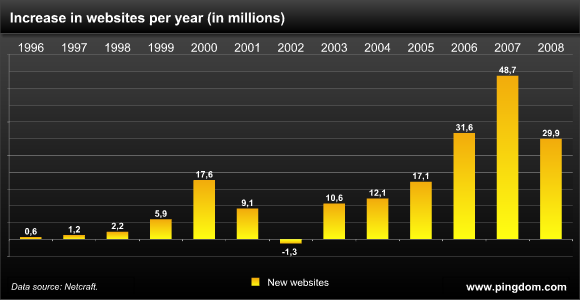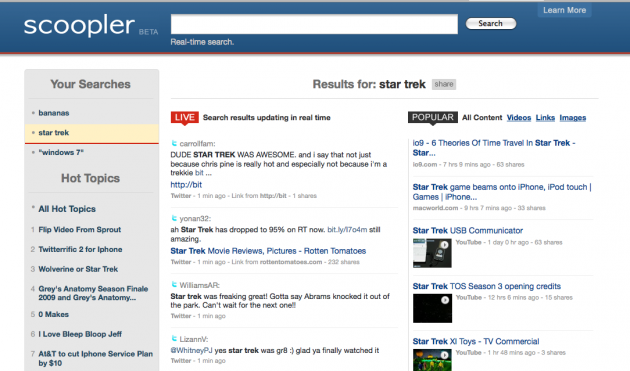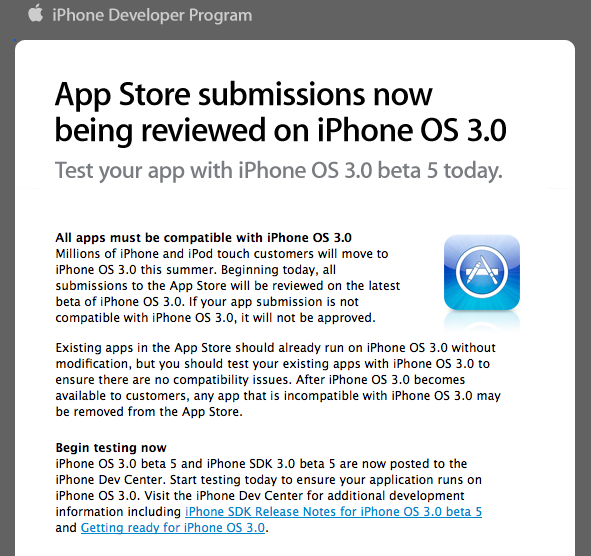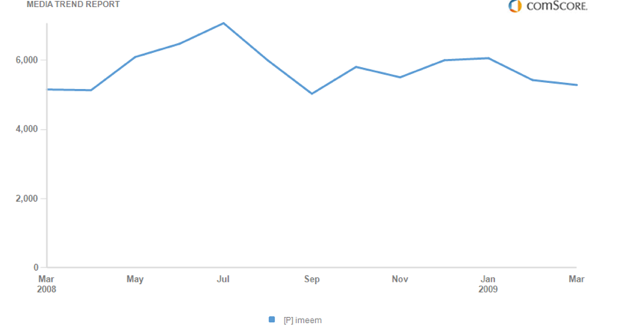The Latest from TechCrunch |  |
| Is the Growth Of The Web Slowing Down Or Just Taking A Breather? Posted: 08 May 2009 07:44 AM PDT
There are now 231.5 million Websites according to Netcraft. But last year the number of new sites added to the Web slowed down to 29.9 million, from 48.7 million in 2007. Royal Pingdom went through Netcraft’s server surveys to come up with the chart above, which shows the increase or decrease in the number of Websites for every year going back to 1996. The growth of the Web so far can be broken down into two five-year cycles, where every year the growth rate gets bigger until there is an economic downturn, when the growth rate takes a breather. In 2001 and 2002 the growth slowed and even went into negative territory, and again in 2008 there was another slowdown in the number of sites added to the Web. It stands to reason that the number of new sites will ebb and flow with the global economy, but it is not clear that there is any direct correlation. For instance, so far in 2009 we’ve added a whopping 46 million sites, many of them Chinese blogs. The total for the year will almost surely be much greater than the 2007 increase, and is already larger than all the sites added in 2008. Does that mean the global economy is already on a rebound or simply that countries like China and Russia are embracing the Web in a big way? These numbers also raise the question of how many sites does the world need—500 million, one billion, ten billion? Maybe the upper limit is the number of people who are on the Web, which is estimated between 1 billion worldwide (comScore) and 1.6 billion right now. Maybe it is more. How many Websites do you have? Here are the top countries by Internet population according to comScore. All the growth is coming from China, Russia, Brazil, and India. (Growth is compared from July, 2008 to March, 2009 for an apples-to-apples comparison because comScore changed its methodology slightly in July, 2008).
Crunch Network: CrunchGear drool over the sexiest new gadgets and hardware. | ||||||||||||||||||||||||||||||||||||||||||||||||||||||||||||||||||||
| Search Goes Real-Time With Scoopler. Twitter Dominates Results. Posted: 08 May 2009 07:00 AM PDT
Scoopler is a search engine that gives you live updating real-time results across a variety of services. These include Twitter, Flickr, Digg, Delicious and others. You enter a query and the middle field on the page returns auto-updating results based on information coming in. The two columns that surround it give you hot search topics and popular content from around the web. It’s a pretty nice view of what is happening on the web at any given moment. The problem here is that a lot of popular real-time results are completely dominated by Twitter. Take tonight, for example. A bunch of people went to go see the new Star Trek movie, which just opened. So a search for “star trek,” yields a ton of results, but every single one of them is from Twitter. It’s nice to have the results auto-refresh when new updates come in, but really this isn’t much better than actual Twitter Search. Less popular search terms produce better results. For example, I just searched “bananas” and a bunch of newly uploaded Flickr photos are mixed in with the tweets. Unfortunately, when it comes to real-time updates, Twitter is going to trump everything else most of the time, because it is a real-time, active communication platform whereas these other services are comparitively passive, lazy rivers of information. One element that’s really nice, is the “Peek” feature, which allows you to take a look at pages being linked to in an overlay on top of the results, so you don’t have to visit the actual page. There is also an easy way to share a result right from Scoopler. There are a few competitors in this space right now as well. One of them, OneRiot, also promises real-time web search. But that service is scouring the web for various pages as they pop up in real time, not updates from all of these social services. In that regard, Scoopler is more like Twitter search or really more like FriendFeed search (though that doesn’t update in real-time — yet). Another service, BlastCasta, mixes Google and Twitter results — which is actually pretty useful (though not live updating). There’s nothing wrong with having a real-time search engine that yields mostly Twitter results, but Scoopler needs to tailor its product to diversify better. Because given some of the things we now know Twitter Search is working on, that seems like it will be more enticing in the long run. Or it needs to hope that another quick publishing platform comes along to challenge Twitter for results domination. Crunch Network: CrunchBase the free database of technology companies, people, and investors | ||||||||||||||||||||||||||||||||||||||||||||||||||||||||||||||||||||
| There’s A Queen On Twitter, And She Ain’t Latifah Posted: 08 May 2009 06:28 AM PDT
And yes, it’s the real deal since it was Matthias Lüfkens who filled us in on her presence on the micro-sharing service, and since Lüfkens works for the World Economic Forum in Davos (where Queen Rania is always a guest) he would know better than us. I asked for final confirmation and Lüfkens responded that he’s 100% sure since he had received an e-mail from Marzia Bisignani (who works for Jordan’s Royal Court). So in case you were in doubt if Queen Rania’s life is more interesting than yours: about two hours ago, she tweeted “Just choppered to airport to receive Pope. Husband piloting, he got acrobatic to quiet butterflies in stomach She likes to relax too, though: “Wknd begins for us, watching Matthew McConaughey in Ghosts of Girlfriends Past. Glad I’m not single. It’s vicious out there!” Her highness started out with the web version, then switched to TweetDeck but seems to do her mobile tweeting with twibble. I’m sure Loïc Le Meur is bummed that she hasn’t tried out Seesmic Desktop yet. I’m just genuinely psyched she joined altogether. I’ve been following her official YouTube channel ever since she started one and I’m always impressed with her views on society and education, and the way she uses digital means to get her message across. Now go follow her. Crunch Network: CrunchGear drool over the sexiest new gadgets and hardware. | ||||||||||||||||||||||||||||||||||||||||||||||||||||||||||||||||||||
| TicketLeap Goes Anywhere With Online DIY Box Office Solution Posted: 08 May 2009 05:25 AM PDT
While there are many companies offering online ticketing services to organizers (full disclosure: I’m a partner at Oxynade, which also markets an e-ticketing solution), TicketLeaps claims to be the first one that provides its customers with a way to use their own computers to sell tickets at their events. It does acknowledge however that there may sometimes be extra equipment needed too (think bar-code scanners or printers) and thus offers a way for their customers to rent it directly from them in case they don’t own any. The cloud-based Anywhere software service includes ticket barcode scanning, the ability for customers to choose their exact seat and support for all sorts of venue customization. TicketLeaps charges a ’small fee’, although it’s unclear exactly how much, for every ticket that gets sold through the platform and says most organizers opt to simply charge the extra fee to the patron. The company expects most ticketing solutions to follow suit and eventually live in the cloud as well. "It's only a matter of time before every ticket you buy comes from web-based ticketing software like this," TicketLeap CEO Chris Stanchak says. "There's really no comparison when it comes to cost, convenience and flexibility." TicketLeap was started by Stanchak as a recent Wharton graduate back in 2003. In July 2008, the company raised its first round of financing: $2 million from MentorTech Ventures and Ben Franklin Technology Partners. Crunch Network: CrunchBoard because it’s time for you to find a new Job2.0 | ||||||||||||||||||||||||||||||||||||||||||||||||||||||||||||||||||||
| Next09: Video Interview With Chris Messina On The Current State Of OpenID Posted: 08 May 2009 02:41 AM PDT
As a reminder, OpenID is a decentralized, distributed single sign-on method that allows users to log onto many services with the same digital identity. That identity can be one of your current profiles on the web, in case the company you registered it with is an OpenID provider. Most of the major players on the Internet are currently providers, including such companies as MySpace, Facebook, Yahoo, Google, Microsoft, PayPal, AOL, and many more, but very few of them have actually become a relying party as well (which would allow someone to log onto Yahoo with their AOL id, for example). About a year ago, Michael argued that companies who make a lot of noise when they become providers but don’t move (quickly enough) to also become relying parties could be exploiting the project for PR reasons and take the gain without the pain. And truth be told, not much has changed since then, even if usage seems to be swinging upwards. Most of the big names that are issuing OpenID parties have yet to support the project by allowing users to effectively be able to sign in to their services with third-party digital identities. The big exception - surprisingly - is Facebook, the first big network that will truly embrace OpenID even if it has a service that competes directly with it (Facebook Connect). For more perspective on that, you should go read the guest post Facebook Connect and OpenID Relationship Status: "It's Complicated". Anyway, Messina and I talked about the current state of OpenID, the love from Facebook, how he hopes the government will once become a massive relying party, the challenges ahead and more specifically if OpenID has a chance against Facebook Connect, Google Friend Connect, Twitter Connect, etc. Crunch Network: CrunchBase the free database of technology companies, people, and investors | ||||||||||||||||||||||||||||||||||||||||||||||||||||||||||||||||||||
| Craigslist Competitor OLX Scores $5 Million For Online Classifieds Posted: 07 May 2009 06:30 PM PDT
OLX, the Craigslist for the rest of the world, has raised $5 million in funding from from Nexus Capital India. The company raised $13.5 million in Series B funding in April 2008 from General Catalyst Partners, Bessemer Venture Partners, Founders Fund and DN Capital, bringing the total funding raised to $28.5 million. OLX raised $13.5 million in Series B funding in April 2008 from the same investors as above, and raised an undisclosed Series A round of $10 million in September 2006 with the same VCs and various angels participating. While the free classifieds site has trouble competing with Craigslist in the U.S., OLX has a strong user base internationally. With a presence in more than 87 countries in 39 languages, OLX’s popularity lies mainly in Spain, India, Portugal, Mexico, South America, China, and the Philippines. Fabrice Grinda, founder and CEO of OLX says the new investment will be used to make new acquisitions, implement site improvements, expand globally, and pursue aggressive marketing initiatives. In 2007 OLX has made an investment in Edeng.cn, a Chinese free classifieds site and acquired Mundoanuncio.com, a Craigslist-like classifieds site targeting the Hispanic market, in 2006. Much of its success in the Philippines can be attributed to its white label partnership with Friendster. Its offices are also spread over the globe with 125 employees (OLX has added almost 35 employees since last year) working in New York, Buenos Aires, Beijing, and Moscow. While OLX may play second fiddle to Craigslist in the U.S., the site prides itself on being a second-generation free classifieds site, complete with Web 2.0 features such as social network widgets, better search capabilities, interactive maps, and mobile functionality. Craigslist has recently been under scrutiny by Attorney Generals over prostitution and the “Craigslist Murder” that have taken place in conjunction with the site. eBay’s Kijiji is also a competitor in the space, but Kijiji has set its sights on catching up to Craigslist in the U.S., even considering a name change. Crunch Network: CrunchGear drool over the sexiest new gadgets and hardware. | ||||||||||||||||||||||||||||||||||||||||||||||||||||||||||||||||||||
| How Fortune, Forbes and BusinessWeek Can Save Themselves Posted: 07 May 2009 05:45 PM PDT
But Arrington keeps berating me to write a post today, so here goes. 24/7 Wall Street did a post the other day saying the sun was setting on Fortune, Forbes and BusinessWeek, and its facts about the finances of these publications are sad and mostly indisputable. Indeed, cutting frequency and staff are near certainties for at least BusinessWeek and Fortune. But I don’t agree that those realities mean the magazines can no longer afford quality, edited, long-form investigative stories. There’s an obvious option for these magazines, and I’m surprised more people aren’t talking about it: Ruthlessly collapse the print and online staffs, run everything online as soon as they write it, except one or two cover-length, long-form glossy pieces. Those will anchor the print issue, rounded out by the best stories from online. Then cut the money spent on trying to court new subscribers, shifting the entire marketing budget to promote the Web or real-life conferences and branded events. You could even use reader comments to flesh the online pieces out more for the print edition, driving more engagement in both the print and online versions. Voila! One publication, not two pretending to be one. And guess what? One publication is a hell of a lot cheaper, even if it's printed on dead trees. Under this system, you still have the enterprise articles, like the Fortune piece 24/7 cites about Bernie Madoff. You just focus and only do one or two of them an issue, keeping 99.9% of your staff focused on writing stellar daily online content. And you optimize your staff to be scrappier, more productive and adapt from an old way of doing journalism, to something closer to blogging. People who can’t or refuse to adapt won’t have jobs. That may sound cruel but if the magazines themselves don’t adapt, no one there will. This plan would save a ton of money. That's right: They can save tons of money and still print a publication. Big national magazines have different economics than a metro daily paper. In some cases the biggest cost is a bloated staff, in others a highly-paid staff with generous corporate credit lines. Remember, most of these staffers were hired during better times and while layoffs have been frequent, they haven't been as far reaching as they probably should have been. With all due respect to 24/7 Wall Street, the average compensation package at one of these three publications isn't $60,000 unless you got hired out of school in the last few years. Think higher. Much higher. Now a lot of these publications will tell you they're all one staff now. But go through the staff boxes and see how many of those names blog, write breaking news online or write anything online with any frequency. Hint: If the question "Is this for print or online?" keeps coming up in your organization, you're doing it wrong. Aside from one investigative piece per issue, there shouldn’t be a difference between the two. As a practical matter, it’s not that different from all of the magazine copy running online after the fact. But if you think about it, that policy elevates the magazine above online. It should be reversed. Why not go the route of closing print completely and going online? First off, you’d kill the print ad revenue stream which is still the bulk of these magazines’ business. But it also abandons the magazines’ competitive advantage. For a lot of people magazines are different from newspapers. They're printed on nice paper with glossy, glitzy photo shoots and painstaking graphic design for a reason. People in them like putting them on their coffee table—or better yet, framing them. Don't underestimate the power reporters working on a cover have to convince a reluctant CEO to talk to them or give them exclusives. It may be one of the few advantages they've got over increasingly influential blogs. Similarly, there's still a huge swath of readers who like flipping through a hard copy of BusinessWeek or Fortune on the plane, or even on a Sunday afternoon. The business world isn't all tech, after all. And as a reporter, I have to be honest. There's nothing quite like seeing your article printed in a glossy magazine. That can be a valuable retention and recruiting tool when used well. As can the implicit promise that the publication still values long-form, investigative reporting that has some shelf life to it. It's not that big, glossy, deeply-reported magazine stories are better than blogs. But they are a different way to tell certain important, complex stories, the same way a book is a different way to tell a story than an article. Not all news needs that kind of methodical, intensely-edited and graphic designed treatment, but I'd argue one or two per month do. And if newspapers keep crumbling, magazines are going to be the only places left that know how to do it. Crunch Network: CrunchBoard because it’s time for you to find a new Job2.0 | ||||||||||||||||||||||||||||||||||||||||||||||||||||||||||||||||||||
| It’s 3.0 Or Die For New iPhone Apps Posted: 07 May 2009 03:53 PM PDT Apple has just sent out an email alert to iPhone developers that any new app submitted to the App Store will have to be ready for the iPhone 3.0 software, which is due shortly (probably around Apple’s WWDC event in June). Beginning today, any app submitted that isn’t 3.0 compatible will be rejected. Here’s the key parts of the email:
I’ve emailed Apple asking if there are any features specifically that developers should be careful about making sure work in the new 3.0 firmware. Google recently outlined some of the key points of the new Android firmware that developers should watch for in order to maintain compatibility. One potential issue as outlined by our tipster Nick is as follows:
[thanks nick] Crunch Network: CrunchBoard because it’s time for you to find a new Job2.0 | ||||||||||||||||||||||||||||||||||||||||||||||||||||||||||||||||||||
| Avatar Startup FUHU Raises $6.25 Million, Strikes Deal With Acer To Put Widgets In PCs Posted: 07 May 2009 03:32 PM PDT
FUHU, a startup that produces virtual avatars and identity cards and rich media web widgets, has secured $6.25 million in Series B funding from The Acer Group (which produces Acer, Gateway, eMachines and Packard Bell computers). FUHU also signed a 10 year contract to distribute FUHU products in all Acer computers and smart mobile phones. FUHU raised $1.5 million in Series A funding in February 2008 from John Hui (co-founder of eMachines), VIA Technologies, UMC Capital, Industrial Bank of Taiwan, Alorica, and several angel investors. FUHU’s urFooz product, an embeddable virtual identity card, allows users to create an avatar and portable profile that contains music, photos, feeds, and videos. The widget then lets users syndicate their profile on social networks (MySpace, Facebook etc.). Through the deal, FUHU will collect computer users’ information with out-of-the-box registration for Acer computers. Users will be given the option to create a urFooz avatar and account upon registration. Here’s one for Britney Spears: Filling out a profile is similar to filling out a profile on a social network—you are asked for the essential information you would share with a friend, including hometown, employers, relationship status, and education. You can link your profile/avatar to your accounts from Facebook, MySpace, Twitter, YouTube, Flickr, FriendFeed, blogs and more. You can also dress your avatar in designer clothes through purchases at urFooz’s virtual mall. And you can embed your urFooz card on any social network, blog or site. The card is dynamically updated on these sites when you update your profile. Currently urFooz has about 20,00 users but CEO Jim Mitchell says that the startup could add 1 to 2 million users a month through the integration of urFooz with Acer computer registration. Whether users will actually feel compelled to keep using the profile is another question. The idea of an embeddable avatar is interesting but you can also share photos, videos, and music within your social networks without the help of a widget, Another FUHU widget that will be integrated with Acer computers is the Spinlets widget, which is a rich media widgets that let users place favorite music, videos, links, pictures, MP3s, ring-tones, news and more on social networks, sites and blogs. Currently, the Spinlets site only lets you embed music widgets on sites but the video, pictures and additional functionality will be coming soon. FUHU says there will be some sort of pre-loaded mashup of the Spinlets widget already downloaded on the computers but would not reveal more details about what this will look like. One of the advantages for Acer in this deal is that the company will have access to data and information about users who set up a urFooz profile, including hobbies, activities, interests, says Mitchell. Acer is also planning to integrate FUHU’s widgets into its smart phones, which are already out in Asia. Acer plans to unveil its smart phones in the U.S. in 2010. Competitors in the rich media widget space include Slide and RockYou. Crunch Network: CrunchBase the free database of technology companies, people, and investors | ||||||||||||||||||||||||||||||||||||||||||||||||||||||||||||||||||||
| Google Friend Connect Adds Comment Translation Posted: 07 May 2009 02:58 PM PDT
For sites that use Google Friend Connect and its comment widget, there is now a novel new feature: comment translation. The comment widget plugs into Google Translate to allow readers to translate comments left in foreign languages. This will be a boon to international blogs and sites, such as Go2Web20, which use Google Friend Connect as a login system. Now you can talk to people half-way around the world, even if they don’t speak the same language. Sort of. The translation is still machine translation, but it is usually good enough to get across the main gist of what people are saying. The way it works is the comment widget has a “translate” link which then pops up a menu of languages to choose from. The translated comments are then highlighted in yellow. Here is a video showing what it looks like in action. Google says that this can work for a variety of sites, including international non-profits such as the World Wide Fund For Nature’s Earth Hour website. The Earth Hour campaign is supported by 4,000 cities in 88 different countries to help engage citizens in conserving energy. Visitors to this website can now leave comments in their native language and use Google Friend Connect’s comment translation to engage in discussions with the greater community. Comment translation is one of several new gadgets that have been rolled out in Google’s Friend Connect gallery, perhaps in an effort to catch up to Facebook Connect. These features include the event gadget, the polls gadget, and the Get Answers gadget. Crunch Network: CrunchBoard because it’s time for you to find a new Job2.0 | ||||||||||||||||||||||||||||||||||||||||||||||||||||||||||||||||||||
| The iPhone Is Accelerating Music Sales For Pandora Posted: 07 May 2009 02:53 PM PDT
Users are buying about a million songs a month now from these affiliate links on Pandora, CTO Tom Conrad tells me. Of those, a solid 20% are coming directly from Pandora’s iPhone app, which includes an easy link to open the iPhone’s iTunes app, and buy a track. That’s really impressive considering that it’s just one phone that a relatively small percentage of their users use. But really, I’m not surprised by this at all, because Pandora has always been a brilliant music discovery service. And when paired with the iPhone, you have an all-in-one new music machine. And Pandora was actually the top downloaded app on the iPhone for all of 2008. But last month, when Apple completed removing DRM from all its iTunes tracks, it created an even a greater incentive to buy music that way. Now, I can buy music on the go, sync it back with my computer when I get home, and listen to it anywhere. Another feature driving affiliate sales is the bulk music purchase option. This allows you to bookmark songs on Pandora, and with one click buy them all on either iTunes or Amazon. 10% of web users who are buying music through Pandora are using this bulk buy feature, Conrad says. Here’s an interesting way to think about these affiliate sales. If Pandora is selling 1 million tracks a month, that’s $12 million in sales a year (though Apple and Amazon make the majority of that). But Pandora is still only less than 1% of all radio when you take into account the terrestrial and satellite varieties. Say hypothetically that Pandora made up 100% of radio, the potential sales of these affiliate tracks would then by $1.2 billion a year, as Conrad notes. That of course is very unlikely to ever happen, even in Pandora’s wildest dreams, but still Conrad says that from Pandora’s own research, they know that for every song purchase Pandora drives, users are likely to buy 3 to 5 more songs on top of the one they found. At this 100% model, that would make Pandora a $3.6 to $6 billion a year business. Why play such a hypothetical? Well because the total recorded music industry revenue last year was only $4.6 billion. Affiliate links can be big business on the web and on mobile. Even before the iPhone app, Pandora was one of the top affiliate purchase drivers for Amazon and iTunes. And amazingly, their main competition wasn’t other online music sites, but instead was search and shopping engines like shopping.com. Given the boost Pandora is already seeing from the iPhone in this regard in just a matter of months, it seems pretty clear that mobile purchases could be a big deal down the road. And just imagine if Apple one day lets apps access iTunes right from within the apps to ease the process even more. With in-app purchases coming in iPhone 3.0, something like that could be possible one day. Crunch Network: MobileCrunch Mobile Gadgets and Applications, Delivered Daily. | ||||||||||||||||||||||||||||||||||||||||||||||||||||||||||||||||||||
| Eric Schmidt On Netbooks: Forget Android, It’s All About Cloud Services Posted: 07 May 2009 02:12 PM PDT
At Google’s Press Event earlier today Schmidt wasn’t interested in talking about Android on netbooks. “We have no announcements on that,” he said. But he then talked about Netbooks passionately, saying the the unit numbers were becoming material and that use cases were “consistent with the cloud computing model” that Google is focusing on with Google Docs, Gmail and other services. “Keep an eye on this space,” he said, suggesting but not outright saying that Google may have announcements around Netbooks soon. (and Google I/O is soon, by the way). Crunch Network: CrunchBoard because it’s time for you to find a new Job2.0 | ||||||||||||||||||||||||||||||||||||||||||||||||||||||||||||||||||||
| Posted: 07 May 2009 01:09 PM PDT
Google’s 2009 shareholder meeting is today at 2 p.m. pst. As usual they’re holding a press event prior to the shareholder meeting. Chairman and CEO Eric Schmidt, SVP Corporate Development David Drummond, VP Search Products and User Experience Marissa Mayer and VP Product Management Susan Wojcicki are attending and taking questions. Key topics discussed: Apple: In response to a question about the FTC inquiry about overlap with the Apple/Google boards of directors, Schmidt says Apple doesn’t see Google and Apple as a primary competitor, and so there shouldn’t be issues with him being on the Apple board. Antitrust: Drummond says he expect to see increasing antitrust scrutiny as Google continues to be successful. Schmidt says information is incredibly important. Governments will pay attention to what Google does, he says, and will hold Google to their core principles. Schmidt says Google understands that there are consequences to mistakes. Schmidt says Google is always trying to find a balance between what their end users need and other concerns. “We are more careful about when and how we do things that are going to raise concerns of any party.” He brings up book search, says careful planning has lead to a historic agreement that is winding its way through the court system. Monetization of social networks: Susan “we’ve learned a lot about how to monetize this inventory, we believe there are ways to monetize over time but different from search because by nature different from search.” Says they’ve been working on how to serve those ads differently, talks about ads in activity streams. Google selling AOL stake: Drummond - it was a financial decision to sell the stake. Eric quips “we love aol, we sent our best guy there to run it.” Plans for customized news: Marissa, who just testified on news to congress, says they have a team looking at how news will evolve. how stories are presented. navigation. finding and traversing news. some things aren’t as good in online news. comments. what to suggest next after a story is read. presentation of stories and how people move from one story to the next. Marissa is talking about the recent google labs products around news. YouTube: question on estimated YouTube losses this year. Eric says he “believes youtube will eventually be a successful and profitable business. I don’t know how long it will take. it is a huge traffic phenomenon.” Susan says the huge amount of traffic has attracted lots of advertisers. They’ve monetized hundreds of millions of videos, she says. Preroll formats are being tested, she says, and there’s an opportunity to serve ads in different formats. On music videos, need a click to buy next to the video. Cost cutting v. innovation: Question on how google keeps innovation going with cost cutting so aggressively. Eric says they’re focused on being more precise in their actions. Susan says Google is focused on small teams that act like startups. Eric says its too early to speculate on what Google looks like post recession. Says Internet growth not slowing and people spending more time online. Google Ventures Drummond says they’ve made initial investment and hired partners. Goal is to go early stage, professional investing in areas they care about, which is a wide variety of areas. Cost per click decline: 10Q showed a 14% CPC decline, asked to comment. Eric says they won’t comment much beyond the public statements. Android: Is android an open platform for innovation v. carriers trying to splinter. Eric says this is a problem with any open source project. China situation: Drummond says it is an ongoing challenge to operate there. YouTube continues to be blocked. issues with google.com from time to time. Says there’s a preference for local businesses there. It’s a difficult road, he says. Google and Twitter: Marissa says lots of interesting things happening. Interesting from a search perspective. Some overlap with google trends. “we’re interested in being able to add microblogging into search, but no specific plans.” Android on Netbooks: Eric says no announcement on netbook strategy but says that netbooks are very real, and that people are using netbooks that are consistent with the cloud computing model. client device to access cloud services, google wants their services to work with netbooks and to keep an eye on this space. Live blogging continuing… Crunch Network: CrunchBase the free database of technology companies, people, and investors | ||||||||||||||||||||||||||||||||||||||||||||||||||||||||||||||||||||
| Caption Contest: Win A Pair Of Tickets To Tonight’s Sold Out Star Trek Screening Posted: 07 May 2009 12:53 PM PDT  Our opening night screening of Star Trek tonight in Redwood City is totally sold out, but we’ve held back ten tickets for a special Trekkie caption contest. The rules are simple: leave a comment with a funny caption for the photo above, and we’ll pick out the five best entries, who will each win a pair of tickets. We’ll choose the winners at 2:45 PM PST (be sure to leave your real Email address so we can contact you). Update:: The winners have been chosen. We’re also opening up a waitlist for the movie, which you can sign up for here. We’re thinking that the first 20 people (and possibly more) on the list should make it, but you have to be there in person and there are no guarantees, so give it a shot if you don’t mind potentially getting turned away. For those of you who already have a ticket, we’re going to be letting people into the theatre beginning at 6, so get there before that if you want a good seat. Feel free to leave a caption if you already have a ticket, just be sure to note that you don’t want to be in the running (likewise for those of you who aren’t in the San Francisco Bay Area but want to show off your Trekkie wit). The movie begins promptly at 7 PM at Century 20 Theaters in Redwood City, and after that we’ll head over to Red Latern for some drinks (everyone is welcome, even those of you who can’t make the movie). Thanks again to the event’s sponsors: Microsoft Live Search, which helps more than 200 million people a month find stuff on the web, is buying everyone a soft drink at the theater. Trapster, a location based mobile application that alerts users in real time when they approach speed traps (iphone app here), is buying everyone popcorn. SugarSync, a digital life management service that lets user back-up, sync and access documents, photos and music across all of their devices. And Eventbrite for helping with the cost of the tickets.   Crunch Network: CrunchGear drool over the sexiest new gadgets and hardware. | ||||||||||||||||||||||||||||||||||||||||||||||||||||||||||||||||||||
| Happiness In Slavery: NIN iPhone App Approved With No Changes Posted: 07 May 2009 12:51 PM PDT
NIN frontman Trent Reznor tweeted out the good news earlier and poked fun at Apple’s uneven app approval process. “The NIN iPhone app is unchanged, the “issues” seem to have been resolved,” Reznor joked. This follows his profanity-laced tirade over the weekend in which he ripped Apple’s ridiculous app approval policies. And rightfully so. So it’s all’s well that ends well, I guess. At least until the next App Store rejection. In the meantime, I thought it might be appropriate to post the lyrics to NIN’s “Happiness In Slavery”:
Crunch Network: CrunchGear drool over the sexiest new gadgets and hardware. | ||||||||||||||||||||||||||||||||||||||||||||||||||||||||||||||||||||
| Facebook Connect For The iPhone Has Been Borked Since Yesterday Posted: 07 May 2009 12:31 PM PDT
Based on several tips and various bitching around the web, it’s pretty clear that Facebook Connect for the iPhone has been broken since yesterday. This of course is a huge problem when a lot of apps rely on the service for their apps to function. Various users are reporting seeing this error when trying to login to an app via Connect:
A thread on Facebook Platform Developer Forum features several pissed off developers explaining the problem in detail. Apparently, some people are able to login, but when they try do anything, nothing works. I’ve contacted Facebook for the official word on what is going on and will update when I hear back. Update: A Facebook Platform team member, Matt Trainer, has just responded in the forum:
Update 2: Here’s the statement I got from Facebook:
A day hardly seems like a short period of time, but at least it will be working again soon. Crunch Network: MobileCrunch Mobile Gadgets and Applications, Delivered Daily. | ||||||||||||||||||||||||||||||||||||||||||||||||||||||||||||||||||||
| Interview: James Weatherson, Red Inflight Entertainment Engineer on Virgin America Posted: 07 May 2009 12:15 PM PDT  A few weeks back I hopped onto my first Virgin America flight with Aircell's Gogo service on-board. It wasn't the first time I've reviewed Gogo and if you recall I was on the first commercial Gogo flight with American Air. The plan was to interview James Weatherson, Virgin America's inflight entertainment engineer, while I was up in the air, but there was a scheduling mix up and the interview never went down. So we opted to do it the old fashioned way. Below is my brief conversation with James about Red and where it's headed. CrunchGear: Other than some content changes, I haven't seen a whole lot of new stuff for Red. What can we expect to see this year from VX? A few weeks back I hopped onto my first Virgin America flight with Aircell's Gogo service on-board. It wasn't the first time I've reviewed Gogo and if you recall I was on the first commercial Gogo flight with American Air. The plan was to interview James Weatherson, Virgin America's inflight entertainment engineer, while I was up in the air, but there was a scheduling mix up and the interview never went down. So we opted to do it the old fashioned way. Below is my brief conversation with James about Red and where it's headed. CrunchGear: Other than some content changes, I haven't seen a whole lot of new stuff for Red. What can we expect to see this year from VX? | ||||||||||||||||||||||||||||||||||||||||||||||||||||||||||||||||||||
| When It Comes To URL Shorteners, bit.ly Is Now The Biggest Posted: 07 May 2009 11:46 AM PDT
Well, that was fast. No more than a day or two after Twitter switched over to bit.ly as its default link shortener (from TinyURL), bit.ly is now the most popular URL shortening service. According to statistics published by Tweetmeme, bit.ly now accounts for 46 percent of all the short URLs on Twitter over the past 24 hours, while TinyURL’s share is down to 43 percent. Just over a month ago, TinyURL had an overwhelming 75 percent share to bit.ly’s 13 percent share. According to Tweetmeme, bit.ly overtook TinyURL sometime last night. URL shortening services have come into vogue along with the Twitter’s rise because of its 140-character limit. Bit.ly, TinyURL, and others condense the links with shorter ones that are Twitter-friendly and then redirect to the original pages. Standardizing on one URL shortening service that can provide Twitter with the underlying data about the pages being linked to could help Twitter with its plans to start indexing those links. It is all about search and mining the thought stream. Bit.ly came out of Betaworks, which was also an investor in Summize—the startup Twitter bought when it realized it needed its own real-time search engine I wonder how much bit.ly is worth now. (Hat tip to Jenna Wortham). Crunch Network: CrunchGear drool over the sexiest new gadgets and hardware. | ||||||||||||||||||||||||||||||||||||||||||||||||||||||||||||||||||||
| Warner Music Says Imeem Is Worthless, And Owes It $4 Million Which It Can’t Collect Posted: 07 May 2009 10:55 AM PDT
How bad are things getting for music streaming startups? We knew that imeem was on the verge of shutting down before getting a last-minute cash infusion from some of its investors, but an SEC filing from Warner Music adds some more details about exactly how dire imeem’s situation is, as well as that of another music startup, Lala. Warner Music Group, an investor in both imeem and Lala, thinks they are no longer worth much, if anything at all. It wrote down its entire investment in imeem and half of its investment in Lala in the most recent quarter. As detailed in its 10Q report filed with the SEC, it took a $16 million charge to write down its investment in imeem, and an $11 million charge to write down part of its investment in Lala, plus it took another $4 million charge to write down a bad debt from imeem which it never expects to collect. That comes to a total of $33 million down the digital music drain. But the reason imeem is in such dire financial straits is because of the crushing payments to music labels it has to dole out for every song streamed from its site. It has renegotiated its deals with the labels to pay on a revenue-per-user basis instead of per stream, and Warner’s filing hints at why it had to do so. It appears that imeem had simply stopped paying those per-stream fees, which would explain the $4 million in bad debt. And that was just for one quarter for one label. No wonder imeem nearly ran out of cash. It had to stop paying its bills. According to comScore, imeem’s U.S. traffic has come down about 25 percent off its peak last July. As of March, 2009 it was at 5.3 million unique visitors in the U.S. and 24 million worldwide. In the perverse world of music streaming licensing, the bigger your audience, the more money you lose. Update: When imeem raised rescue money from investors, it had to recapitalize. If Warner pitched in, which presumably it did, then it would have had to write down its old investment anyway. If that is the case, then maybe it doesn’t think that imeem is completely worthless, it is just marking its investment to market. With a recap that means marking it down to zero. But any additional investment after the recap wouldn’t be reflected in that write-down. And since you can still stream Warner artists on imeem, it stands to reason that Warner has not entirely abandoned the startup. Where there is music, there is hope.
Crunch Network: CrunchGear drool over the sexiest new gadgets and hardware. | ||||||||||||||||||||||||||||||||||||||||||||||||||||||||||||||||||||
| Brilliant New API Startup Generates 1,000s Of Videos On The Fly Posted: 07 May 2009 10:36 AM PDT
Where Animoto and Stupeflix completely diverge is in their approach and business model. Stupeflix has effectively come up with an API which describes video, text, using and pictures in flash video based on an XML description. So instead of actually editing the video you edit the XML. That means you can edit video just by changing a tag, or by telling their engine to run a different kind of effect for every video you wants to generate. iMovie would create just one video, and requires a meaty package to edit how it’s presented. With Stupeflix you just edit the XML, with tags like “rotate” or “fade left”. Today Stupeflix launches the web interface to its video editing web application and as a demonstration they’ve generated over 1,000 videos direct from Wikipedia content, automatically, in under 60 minutes. Crunch Network: CrunchBoard because it’s time for you to find a new Job2.0 | ||||||||||||||||||||||||||||||||||||||||||||||||||||||||||||||||||||
| FreshBooks Adds Collaboration Tool To Online Billing Service Posted: 07 May 2009 09:23 AM PDT
Outsourcing projects to freelancers comes naturally to small service-oriented businesses. But juggling multiple time sheets from different contractors and managing projects from a variety of freelancers can be a hassle. Collaboration between freelancers and small businesses is key in order to managing projects efficiently. FreshBooks, a Toronto-based invoice startup, is adding a new networking feature to its software that allows freelancers and small businesses to work with each other directly within the program and share this information freely. Through the “Contractor” feature, FreshBooks users can create and share client projects across FreshBook accounts, with multiple users able to access different accounts. Formerly, FreshBooks users couldn’t collaborate on projects across the Internet. Of course, there are privacy issues to managing a project online. Businesses may not want to show a contractor the markup rate they are charging for services to a client. FreshBooks maintains that you can share certain information (like invoices, time sheets, billing) but also keep privileged client information private on the network. The Contractor feature also facilitates real-time project tracking, giving businesses visibility into a contractor's progress on a project. FreshBooks, which we reviewed here, lets you create invoices, time sheets and estimates within the browser. FreshBooks has free and paid plans and has served 700,000 users since its launch in 2004. The startup has steadily added useful features to its billing service over the past few years, including benchmark reports on aggregated business data, an open API, and data mining from users. Competitors in the online billing space include BillMyClients and Blinksale. Software As A Network from FreshBooks on Vimeo. Crunch Network: CrunchBase the free database of technology companies, people, and investors |
| You are subscribed to email updates from TechCrunch To stop receiving these emails, you may unsubscribe now. | Email delivery powered by Google |
| Inbox too full? | |
| If you prefer to unsubscribe via postal mail, write to: TechCrunch, c/o Google, 20 W Kinzie, Chicago IL USA 60610 | |



 Forget Ashton Kutcher and Oprah Winfrey, there’s a genuine queen on Twitter these days:
Forget Ashton Kutcher and Oprah Winfrey, there’s a genuine queen on Twitter these days: 
 The last video interview I did at the
The last video interview I did at the 
 I'm getting shit for this post no matter what. By insinuating business magazines are better off than papers when I currently write a column for BusinessWeek people will call me biased. (As Arrington would say, "consider that your disclosure.") Likewise, I have a lot of friends at all three publications who probably won't appreciate what I have to say, because it’s not in their economic interest.
I'm getting shit for this post no matter what. By insinuating business magazines are better off than papers when I currently write a column for BusinessWeek people will call me biased. (As Arrington would say, "consider that your disclosure.") Likewise, I have a lot of friends at all three publications who probably won't appreciate what I have to say, because it’s not in their economic interest.



 Many people are dying to get Google’s Android operating system onto their netbooks - Google’s OS running on the miniscule computers seems like a match made in computing heaven (or at least better than the bloated Windows or unusable (for newbies) Linux. And Android netbooks are certainly coming soon. Dell, for example, is
Many people are dying to get Google’s Android operating system onto their netbooks - Google’s OS running on the miniscule computers seems like a match made in computing heaven (or at least better than the bloated Windows or unusable (for newbies) Linux. And Android netbooks are certainly coming soon. Dell, for example, is 
 Well, apparently if you speak loudly enough on the web with
Well, apparently if you speak loudly enough on the web with  Facebook Connect is an absolute boon for
Facebook Connect is an absolute boon for 




No comments:
Post a Comment